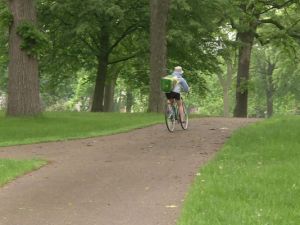The following report was posted on KARE 11’s website on May 29, 2014.
Minneapolis park system tops in nation
(Photo: KARE)
Many residents of Minneapolis will tell you that the vast park system is the crown jewel of the city.
Well, the folks at The Trust for Public Land will back that up. The nonprofit organization’s 3rd annual ParkScore® index gave Minneapolis a perfect “5-park bench” rating, naming the Mini-Apple’s park system as the country’s best for the second straight year. New York, Boston, Portland, and San Francisco round out the top five.
“We’re thrilled to receive this prestigious honor from The Trust for Public Land a second time,” said Jayne Miller, Superintendent of the Minneapolis Park and Recreation Board.. “When residents voted for an independent Park Board in 1883, they most likely didn’t envision a park system that would grow to 6,790 acres of parkland serving more than 21 million visits each year.”
The Trust for Public Land ParkScores are based equally on three factors: Park access, which measures the percentage of residents living within a 10-minute walk of a park (approximately ½-mile); Park size, which is based on a city’s median park size and the percentage of total city area dedicated to parks; and Services and investment, which combines the number of playgrounds per 10,000 city residents and per capita park spending. In addition to the national ranking, each city receives a “park bench” rating on a scale of zero to five.
With 94 percent of residents living within a 10-minute walk of a park, Minneapolis received especially high marks for park access. The city’s strong parks budget also boosted its ParkScore rating. Second-place finisher New York fared slightly better on park access, with 97 percent of residents living with within a 10-minute walk of a park. However, New York was hurt by its low median park size, just 1.1 acres compared to Minneapolis’ 7.1-acre median.
According to The Trust for Public Land, the 10 highest-ranking city park systems in the United States are:
1. Minneapolis 5.0 park benches
2. New York 4.5 park benches
3. Boston (tie) 4.0 park benches
3. Portland (tie) 4.0 park benches
3. San Francisco (tie) 4.0 park benches
6. Washington, DC 4.0 park benches
7. Denver (tie) 4.0 park benches
7. Sacramento (tie) 4.0 park benches
9. San Diego 4.0 park benches
10. Virginia Beach (tie) 4.0 park benches
10. Aurora, CO (tie) 4.0 park benches DEBUT CITY
The 10 lowest-ranking city park systems are:
51. Jacksonville 2.0 park benches
52. Santa Ana 1.5 park benches DEBUT CITY
53. San Antonio (tie) 1.5 park benches
53. Memphis (tie) 1.5 park benches
55. Oklahoma City 1.5 park benches
56. Mesa, AZ 1.5 park benches
57. Charlotte 1.0 park benches
58. Indianapolis (tie) 1.0 park benches
58. Louisville (tie) 1.0 park benches
60. Fresno 1.0 park benches





